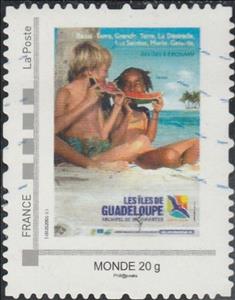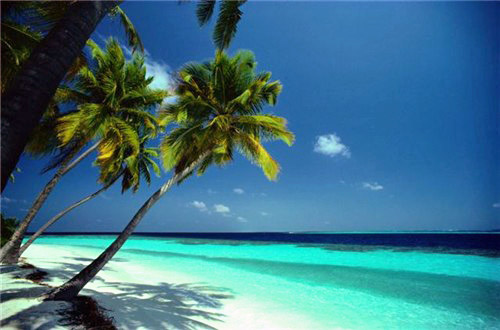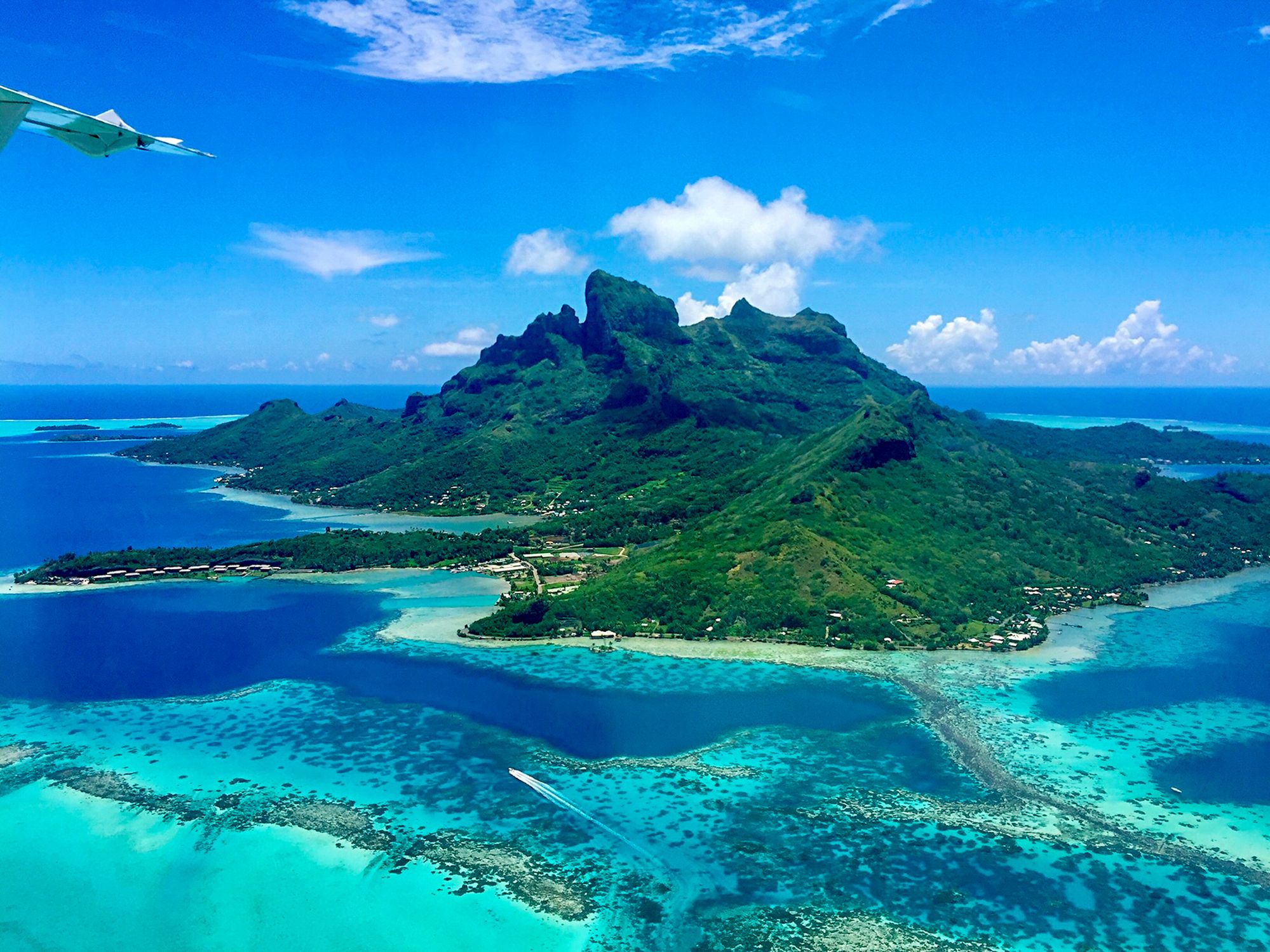Stamp: Guadeloupe Islands. Children eating water melon on the beach (Personalized and Private Mail Stamps 2021)
Guadeloupe Islands. Children eating water melon on the beach (Personalized and Private Mail Stamps 2021)
01 January (Personalized and Private Mail Stamps ) within release France : Montimbremoi Private Issues goes into circulation Stamp Guadeloupe Islands. Children eating water melon on the beach face value 20 No Face Value
| Stamp Guadeloupe Islands. Children eating water melon on the beach in catalogues | |
|---|---|
| Colnect codes: | Col: FR-MON 2021-82 |
Stamp is square format.
Also in the issue France : Montimbremoi Private Issues:
- Stamp - Invitation face value 20;
- Stamp - Painting face value Lettre;
- Stamp - Painting of Vase of Flowers face value 20;
- Stamp - UNADEV Union National Aveugles Deficients Visuels face value 20;
- Stamp - Votre Pharmacie vous ecrit face value 20;
- Stamp - Agriculture Territoires Chambre d'Agriculture Moselle face value 20;
- Stamp - Bar le Select PMU Chedde face value 20;
- Stamp - Charles Borrel-Clerc 1879-1959 face value 20;
- Stamp - Dog face value 20;
- Stamp - France Bleu Touraine. Le pique-nique des 30 ans face value 20;
- Stamp - ID WAD Interoir Design face value 20;
- Stamp - Les Jardins du Chateau du Villandry face value Lettre;
- Mini Sheet - Loiret Au fil de la rose face value 4*20;
- Stamp - Loiret Au fil de la rose face value 20;
- Stamp - Mulot et Petitjean Le Pain d'epices de Dijon face value 100;
- Stamp - Ordre de Malte 4 face value 20;
- Stamp - Philips Sante et Bien Etre 4 face value 20;
- Stamp - Pink face value 20;
- Stamp - Sodern face value 20;
- Mini Sheet - Paleosite. Prehistory. Skull. face value 4*20;
- Stamp - Paleosite. Prehistory. Skull. face value 20;
- Mini Sheet - Papillons Blacs APEI de Douais 50 years face value 4*20;
- Stamp - Papillons Blacs APEI de Douais 50 years face value 20;
- Mini Sheet - 10th Multi-collections Fair St Jean de Mne face value 10*20;
- Mini Sheet - 25th Book Fair. Hermillon. 20th Literature Prize Rosine.... face value 10*20;
- Stamp - 25th Book Fair. Hermillon. 20th Literature Prize Rosine.... face value 20;
- Stamp - Cocoto Bigben face value 20;
- Stamp - Endometriose Endomind face value 20;
- Stamp - Fete de la Mer Boulogne sur Mer. Shrimp Fisherwoman face value 20;
- Stamp - Kronome 1999 face value 20;
- Stamp - Pulse par la poste face value 20;
- Stamp - Saint Jean de Maurienne face value 20;
- Stamp - ADOSM Brest face value 20;
- Stamp - AGTX Prototype face value 20;
- Stamp - Antic Wine face value 20;
- Stamp - Apcld 1 face value 20;
- Stamp - Apcld 2 face value 20;
- Stamp - Beaumont. Model face value 20;
- Stamp - Beynost face value 20;
- Stamp - Bouin Batiment face value 20;
- Stamp - BTMO Machines Outils 1 face value 20;
- Stamp - BTMO Machines Outils 2 face value 20;
- Stamp - Caravane face value 20;
- Stamp - Charles Borel-Clerc Composer 1879-1959 face value 20;
- Booklet - Charles Borel-Clerc Composer born in Nay 1879-1959 face value 4*20;
- Stamp - Chateau Belfort. Saint Medard en Jalles. 50 years Assoc face value 20;
- Stamp - Chateau de Landskron face value 20;
- Stamp - Chateau Dubuc face value 20;
- Stamp - Chatillon Ville Eco-responsable face value 20;
- Stamp - Children's Rights. Droits d'enfant grandissent les Hommes face value 20;
- Stamp - Christmas Nativity. Creche de Noel. Orschwihr face value 20;
- Stamp - Church. Eglise Gesu Nice face value 20;
- Stamp - CMCAS. Light on the womens world market. Lumieres face value 20;
- Stamp - Cogs face value 20;
- Stamp - Combat Tiger Helicopter face value 20;
- Stamp - Corsaire Bucaille face value 20;
- Stamp - Credit Agricole. Share Holder 2 face value 20;
- Stamp - Dr Karl Landsteiner face value Lettre;
- Stamp - Expert Teleportation face value 20;
- Stamp - Flags of Brittany and Scotland face value 20;
- Stamp - For saying hello face value 20;
- Stamp - Freres Jacques Poster by Jean-Dennis Maccles. 1912-2002 face value 20;
- Stamp - Gap Foire Expo face value 20;
- Stamp - Giraffe Neck face value 20;
- Stamp - God Save the Queen face value 20;
- Stamp - Grand Habitat Lyon face value 20;
- Stamp - Guadeloupe Islands. Children eating water melon on the beach face value 20;
- Stamp - Horse. Corinne Dupeyrat. Animal Artist face value 20;
- Stamp - Icos Immobilier face value 20;
- Stamp - Ile de France Film Commission face value 20;
- Stamp - Jean Vinchon Numismatist face value 20;
- Stamp - La Chope Bistrot Timbres face value 20;
- Stamp - Lace. Alencon Museum face value 20;
- Stamp - Lalique. Master Glassmaker face value 50;
- Stamp - LCL Bank face value 20;
- Stamp - Lorrain Honey and Quince Jam face value 20;
- Stamp - Melles face value 20;
- Stamp - NDB Koupela face value 20;
- Stamp - Parc des Sceaux face value 20;
- Stamp - Passage Pommeraye face value 20;
- Stamp - Philatelist. Caminal Pierre. Achat Vente Estimation face value 20;
- Stamp - Philatexte face value 20;
- Stamp - Recipe Book. "Je cuisine" by Isabelle Arnolou face value 20;
- Stamp - RSI Regime Social des Independants face value 20;
- Stamp - Saint-Gildas-des-Bois face value 20;
- Stamp - Saludiers. Ballet de Paludiers face value 20;
- Stamp - Sarthe.fr face value 20;
- Stamp - Schenker-Joyau face value 20;
- Stamp - Seebach face value 20;
- Stamp - Seep face value 20;
- Stamp - Sonepar connect face value 20;
- Stamp - Terre Tropicana. Orchid face value 20;
- Stamp - TFT Transport face value 20;
- Stamp - Tournee en Image. Pyrenees Orientales. Heron face value 20;
- Stamp - Tram 1 face value 20;
- Stamp - Tram 2 face value 20;
- Stamp - Viila Bel Horizon face value 20;
- Stamp - Viilargondran. Rosine Perrier Museum. Resistance Maurienne face value 20;
- Stamp - Wash-house and Church, Les Vans Ardeche face value 20;
- Stamp - Windmill, Leers face value 20;
- Stamp - Wine Tasting. Barrels face value 20;
- Stamp - "The Kiss", painting by Gustav Klimt face value Lettre;
- Stamp - Aerotrain Interurbain I.80 face value Prioritaire;
- Stamp - Chateau Digoine face value Lettre;
- Stamp - Europe Solidaire face value Prioritaire;
- Stamp - I Love Nice. Rauda Capeu face value Lettre;
- Stamp - Lets Forget our differences. Depassons nos differences face value Prioritaire;
- Stamp - Saint-Josse sur mer, Pas de Calais. Village in Bloom face value Lettre;
- Stamp - Tin of Henaff Pate face value Prioritaire;
- Stamp - Unicef face value Prioritaire;
- Stamp - BCA Broderie Confection des Alpes face value Prioritaire;
- Stamp - Evasion Triangle Festival Lyon 20 years face value Prioritaire;
- Stamp - Florist. Atelier Fleuriste face value Prioritaire;
- Stamp - FNAIM Brittany face value Prioritaire;
- Stamp - Giant Elephant Nantes face value Lettre;
- Stamp - Painting of Horseman on a white horse face value Prioritaire;
- Stamp - Sea Jets. Sea Rescue Service face value Lettre;
- Stamp - Solitaire de Figaro Eric Rempant Cachemire Yacht Race face value Prioritaire;
- Stamp - Vitre Chateau face value Prioritaire;
- Mini Sheet - Yes we fish. Pecheur.com face value 4*Prioritaire20;
- Stamp - Yes we fish. Pecheur.com face value Prioritaire;
- Stamp - 8 Art face value Lettre;
- Stamp - Cachemire face value Prioritaire;
- Stamp - Confederation Generale CIQ Marseille face value Prioritaire;
- Stamp - Espace Charenton face value Prioritaire;
- Stamp - Ferryville Memory Monument face value Prioritaire;
- Stamp - Hortiflorbureau. 3 generations of passion. Garden Shop face value Prioritaire;
- Stamp - I love Science face value Prioritaire;
- Stamp - Novalac 2 Baby Milk face value Lettre;
- Stamp - Painting of an Actor Comedie Francais by Edmond Geffroy face value Prioritaire;
- Stamp - Agence France Locale face value Lettre;
- Stamp - Bati-Mat-TP CFTC,La loi de Defense. Syndicat des Salaries... face value Prioritaire;
- Stamp - Cathedrale Notre Dame de Paris face value Lettre;
- Stamp - Cathedrale Notre Dame de Paris. Stained Glass Rose Window face value Prioritaire;
- Stamp - Coleno Maitrise d'Oeuvre face value Prioritaire;
- Stamp - Digger on a trailer face value Prioritaire;
- Stamp - Fraternite Khabab Biarritz face value Lettre;
- Stamp - Haulchin face value Prioritaire;
- Stamp - Holidays are not a luxury/Les Vacances n'est pas du luxe face value Prioritaire;
- Stamp - JAQK in cards we trust face value Prioritaire;
- Stamp - Lamanere Southern most Village in France face value Prioritaire;
- Stamp - Medals face value Prioritaire;
- Stamp - Paintng of a Harbour face value Prioritaire;
- Stamp - Voyage between China and the Mediteranean Letter B in Blue face value Prioritaire;
- Stamp - Yellow Silhouette; Dessiner Tracer face value Prioritaire;
- Stamp - Brown Silhouette of Tree on Reddish background face value Prioritaire;
- Stamp - Cabbage Festival. Saint Saens Chou en Fete face value Prioritaire;
- Stamp - In a field. A travers Champs face value Prioritaire;
- Mini Sheet - Lens Maison Syndicale des Mineurs face value 4*Prioritaire;
- Stamp - Lens Maison Syndicale des Mineurs face value Prioritaire;
- Stamp - Poster Stamp of St Amand Mont Rond Aviation 1911. face value Prioritaire;
- Mini Sheet - SMLH Societe des Membres de La Legion d'Honneur face value 8*Prioritaire;
- Stamp - SMLH Societe des Membres de La Legion d'Honneur face value Prioritaire;
- Stamp - Tourist Photo Entrance to the Metropolitan Line Metro Paris face value Prioritaire;
- Stamp - Valence Route Nationale RN7, Cars - Peugeot 204 Citroen 2CV face value Lettre;
- Stamp - Ville de Rousset 13790 face value Lettre;
- Stamp - Wind Chimes at Sunset face value Monde;
- Stamp - Agglomeration Royan Atlantique face value Prioritaire;
- Stamp - AGTX Prototypes face value Prioritaire;
- Stamp - Better Insured/Mieux Assure face value Lettre;
- Stamp - Bolquere Pyrenees 2000 face value Prioritaire;
- Stamp - Centre Study and Care of Marine Turtles Aquarium La Rochelle face value Prioritaire;
- Stamp - E.C. Taize Aizie face value Prioritaire;
- Stamp - Moulinu di Savina Terre Rosse Cagnanu face value Lettre;
- Stamp - Theoule-sur-Mer face value Prioritaire;
- Stamp - Urgo 1959 Birth of the Good Man Logo face value Prioritaire;
- Stamp - Braley face value Destineo;
- Stamp - Gaps Formations face value Prioritaire;
- Stamp - Leko face value Lettre;
Stamp Guadeloupe Islands. Children eating water melon on the beach it reflects the thematic directions:
A beach is a landform alongside a body of water which consists of loose particles. The particles composing a beach are typically made from rock, such as sand, gravel, shingle, pebbles, etc., or biological sources, such as mollusc shells or coralline algae. Sediments settle in different densities and structures, depending on the local wave action and weather, creating different textures, colors and gradients or layers of material.
Biologically, a child (plural: children) is a human being between the stages of birth and puberty. The legal definition of child generally refers to a minor, otherwise known as a person younger than the age of majority. Child may also describe a relationship with a parent (such as sons and daughters of any age) or, metaphorically, an authority figure, or signify group membership in a clan, tribe, or religion; it can also signify being strongly affected by a specific time, place, or circumstance, as in "a child of nature" or "a child of the Sixties". There are many social issues that affect children, such as childhood education, bullying, child poverty, dysfunctional families, child labor, hunger, and child homelessness. Children can be raised by parents, by fosterers, guardians or partially raised in a day care center.
In botany, a fruit is the seed-bearing structure in flowering plants (also known as angiosperms) formed from the ovary after flowering. Fruits are the means by which angiosperms disseminate seeds. Edible fruits, in particular, have propagated with the movements of humans and animals in a symbiotic relationship as a means for seed dispersal and nutrition; in fact, humans and many animals have become dependent on fruits as a source of food. Accordingly, fruits account for a substantial fraction of the world's agricultural output, and some (such as the apple and the pomegranate) have acquired extensive cultural and symbolic meanings. In common language usage, "fruit" normally means the fleshy seed-associated structures of a plant that are sweet or sour, and edible in the raw state, such as apples, bananas, grapes, lemons, oranges, and strawberries. On the other hand, in botanical usage, "fruit" includes many structures that are not commonly called "fruits", such as bean pods, corn kernels, tomatoes, and wheat grains. The section of a fungus that produces spores is also called a fruiting body.
An island or isle is a piece of land, distinct from a continent, completely surrounded by water. There are continental islands, which were formed by being split from a continent by plate tectonics, and oceanic islands, which have never been part of a continent. Oceanic islands can be formed from volcanic activity, grow into atolls from coral reefs, and form from sediment along shorelines, creating barrier islands. River islands can also form from sediment and debris in rivers. Artificial islands are those made by humans, including small rocky outcroppings built out of lagoons and large-scale land reclamation projects used for development.
Tourism is travel for pleasure or business; also the theory and practice of touring, the business of attracting, accommodating, and entertaining tourists, and the business of operating tours. Tourism may be international, or within the traveller's country. The World Tourism Organization defines tourism more generally, in terms which go "beyond the common perception of tourism as being limited to holiday activity only", as people "traveling to and staying in places outside their usual environment for not more than one consecutive year for leisure, business and other purposes". Tourism can be domestic or international, and international tourism has both incoming and outgoing implications on a country's balance of payments. Today, tourism is a major source of income for many countries, and affects the economy of both the source and host countries, in some cases being of vital importance.





